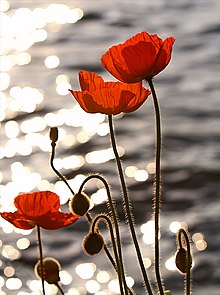
The poppy is an international symbol of that remembrance. Poppies have been a symbol of death since ancient times, perhaps because they are commonly blood-red, or perhaps because their brightness promises life after death. The opium derived from poppies has made them a symbol of peace and sleep, too.
It's a heavy burden for a small wild flower to bear, and in fact it quickly proved too much: difficulties appeared soon after the poppies were first worn to commemorate the dead of the First World War.
The trouble is that no one is quite sure what the poppy stands for: does it glorify sacrifice, or merely commemorate it? Does it glorify war - or just the opposite? Does it commemorate all soldiers killed in war, or just the ones who fought on one side?
A suggestion that there should be white pro-peace poppies is first recorded in 1926 as part of the No More War campaign, but they weren't sold until 1933. The first white poppy wreaths were laid in 1937 as a pledge for peace.
In Northern Ireland the red/white poppy argument splits down community lines: Unionists tend to wear red, Republicans tend to wear white (the objection to the red poppy in Northern Ireland is most commonly because of the red poppy's military connections rather than any pro-war ones).
In New Zealand the white poppy has been used as a fund raiser for Nuclear Disarmament and Peace Scholarships, and in 1970s England there was brief fashion among schoolchildren for taking off the red petals of poppies and replacing them with ones cut out of white blotting paper.
The poppy has caused much heart-searching and some anger over the years, but the arguments about the small and fragile poppy show no signs that I can see of being resolved.
Symbol To Consider Today: poppies. This word comes from the Old English popaæg, and before that from the Latin papāver. The word may originate from the sound of someone chewing poppy seeds, or from the Celtic word papa, baby food, as poppy juice was given to crying infants to make them sleepy.
PS The Methodist Minister Simon Topping launched a campaign in 2001 using the symbol of a black poppy to highlight the problems of world poverty.
No comments:
Post a Comment
All comments are very welcome, but please make them suitable for The Word Den's family audience.